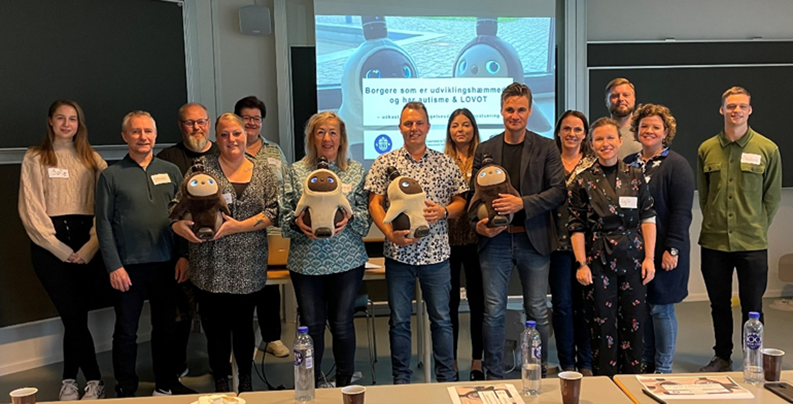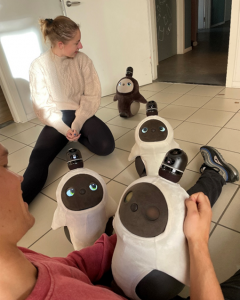About the project
Persons with autism and who are developmentally disabled have communicative, social and behavioural challenges that have great significance for their independence in everyday life and their ability to communicate. Autism cannot be cured, but it is important to develop effective tools that can help strengthen social and communicative skills.
International scientific studies show that persons with autism find it easier to interact with social robots than with humans, as this contact is more predictable and controlled. Being together with robots has been shown to improve the ability to communicate and decrease the stereotypical behaviour. Many studies have investigated the interaction between children with autism and social robots, but only a few have investigated the interaction between adults and social robots.
See the video “Lovot på botilbud” (in Danish; Aalborg Municipality)
The purpose of the study is to investigate:
- How citizens who are developmentally disabled with autism accept a social robot
- Whether the social robot LOVOT can increase well-being, provide security and prevent emotional outbursts among persons who are developmentally disabled with autism
- Advantages and disadvantages of using LOVOT as a communication tool for persons who are developmentally disabled with autism
- How staff and relatives experience advantages and disadvantages of using a social robot in interaction with persons who are developmentally disabled with autism
- The ethical aspects of using a social robot in interaction between staff and persons who are developmentally disabled and have autism
LOVOT
LOVOT is a social robot designed by Groove X. The name, LOVOT, is a contraction of Love and Robot. LOVOT is designed to bring happiness, which it does with its evolving personality and person recognition. With its eyes and body language, LOVOT can show emotions. In addition, it can become warm like a living being and make noises. LOVOT has never before been tested on people with autism, but it has shown promising results when used with persons with dementia.
Target group
LOVOT is to be tested on adults with autism and who are developmentally disabled, living at the residential facilities Hobitten (Sæby), Gennem Bakkerne (Vodskov) and Viften (Vodskov).

Partners in the project
- Residential facility Hobitten (Sæby), Frederikshavn Municipality
- Residential facility Specialgrupperne / Gennem Bakkerne (Vodskov), Aalborg Municipality
- Residential facility Viften (Vodskov), Aalborg Municipality
- Elderly and Handicapped Administration, Aalborg Municipality
- Laboratory for Welfare Technology, SMI, Institute of Medicine and Health Technology, Aalborg University
International partners
GROOVE X, Inc., Tokyo, Japan
Funding
LOVOT is provided free of charge by the Japanese company GROOVE X. The project is financially supported by the Innovation Fund in Aalborg Municipality.
Contact
Professor Birthe Dinesen
Email: bid@hst.aau.dk

